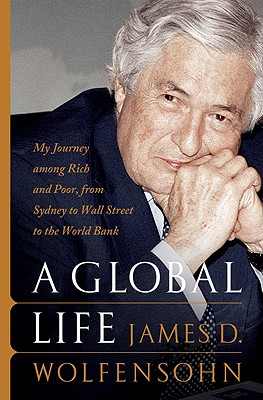A Global Life, by James D. Wolfensohn
This is one of those books that I should love. James D. Wolfensohn is the ultimate capitalist, a “mover and shaker” in the international banking world, a man who understands cross-cultural literacy, who also dedicated a good part of his life to serving the poor. His life story contains elements that I deeply admire. But while I admire what Wolfensohn did with his life, his book is a bit … well, mundane.
Now don’t get me wrong. A Global Life is a fascinating story about about a fascinating life. Wolfensohn, born and raised in Australia, made it big in both New York and London. The list of accomplishments is impressive: a Harvard MBA, a bank president, a former director at the Kennedy Center and Carnegie Hall, and his highest profile role as President of the World Bank. He has lived the kind of life that most of us can only dream about.
But his book … well, the book comes across as a sort of “ah, gee, I really wasn’t a very good student but somehow was accepted at Harvard…I really wasn’t much in the music world but somehow became best friends with Itzhak Perlman….I really wasn’t a wealthy elite banker but somehow found myself dining with kings and queens as I planned my next vacation at Lake Como.” You get the idea? He lived a glamorous life of privilege and incredible experience, but tries to play it down as he also highlights the most engaging stories. It comes across as false modesty.
And in this day of populism, it comes across as elitist. I don’t begrudge Wolfensohn a thing and believe he worked hard for what he achieved — he’s clearly very bright and very talented. But his life story describes the rise of banking in a world that isn’t particularly fond of bankers right now, and without even knowing it he ends up describing a life of privilege that seems wildly out of touch with the rest of us.
As for his role at the World Bank, I applaud him for doing what he could to alleviate poverty in the world. But I also question the validity and effectiveness of the World Bank as an agent of change. Anybody who has read Dead Aid by Dambisa Moyo would have the same concerns.
In the end, I found myself applauding the human being, but disappointed by the book.

